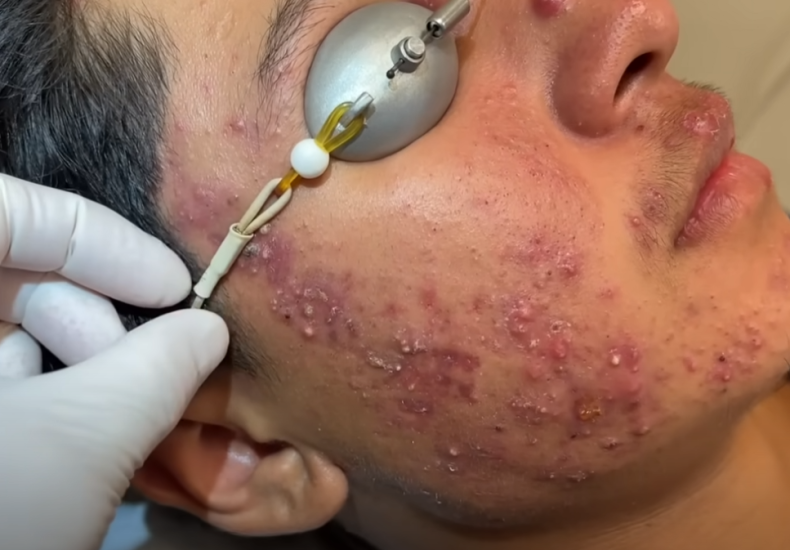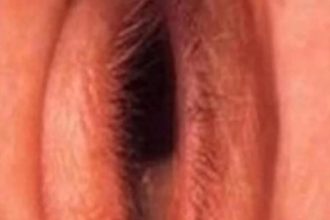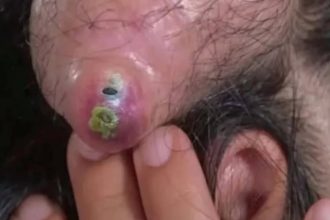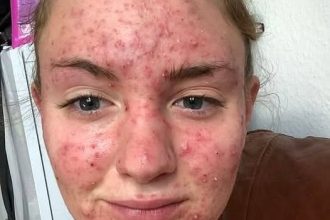
Very severe acne in a preteen patient.Follow his progress.Extractions of blackheads and whiteheads.
Click the link to watch the video.👇👇
Very severe acne in a preteen (typically ages 9–12) requires special care because of their unique developmental stage. At this age, acne can signal early hormonal changes, and early, safe intervention can prevent long-term damage like scarring and psychological distress.
Here’s a detailed overview of how very severe acne in a preteen is typically approached — medically, emotionally, and practically.
🔍What is “Very Severe” Acne?
Very severe acne often includes:
-
Nodules: large, deep, painful bumps under the skin.
-
Cysts: pus-filled lesions that can be tender and inflamed.
-
Widespread presence on face, chest, back, and sometimes shoulders.
-
Often leaves scars or pigmentation even after healing.
🧒🏽Why Acne in Preteens Is Unique
-
Hormonal shifts may be starting early (called adrenarche), even before menstruation or voice changes.
-
Skin is more sensitive, and many treatments for adults may be too harsh.
-
Emotional resilience is still developing — self-esteem is easily impacted.
🩺Medical Management Plan (Under Dermatologist Supervision)
1. Diagnosis
-
Rule out underlying conditions like PCOS (in girls), or rare hormonal disorders.
-
Check family history: acne can run in families.
2. Topical Treatments (First-line for mild-to-moderate lesions)
-
Benzoyl Peroxide (2.5–5%): kills acne-causing bacteria and reduces inflammation.
-
Topical Retinoids (like adapalene): regulate skin cell turnover.
-
Azelaic Acid: anti-inflammatory and helps with pigmentation — gentler option for younger skin.
3. Oral Medications (Only when necessary, under medical guidance)
-
Oral antibiotics (short-term use): like doxycycline or erythromycin.
-
Hormonal therapy (for girls only, if acne is hormonally driven): e.g., spironolactone or birth control — used cautiously and only after puberty onset.
-
Isotretinoin (Accutane): reserved for severe, scarring acne that doesn’t respond to other treatments. Requires strict monitoring due to side effects and age considerations.
4. Adjunct Treatments
-
Light therapy (blue/red LED): reduces bacteria and inflammation.
-
Chemical peels (with salicylic acid): mild, done under supervision only.
-
Non-extraction facials: for gentle cleansing and calming.
❤️Emotional & Social Support
-
Preteens can feel embarrassed, anxious, or even bullied due to acne.
-
Encourage open conversations. Let them know acne is common and treatable.
-
Avoid blaming hygiene — this adds shame.
-
Praise efforts and encourage patience (acne takes weeks to improve).
✅At-Home Care Tips (Gentle Routine)
-
Use a fragrance-free, non-comedogenic cleanser once or twice a day.
-
Moisturize with a lightweight, oil-free lotion (yes, even oily skin needs moisture).
-
Avoid scrubbing, picking, or popping lesions — this causes scars.
-
Use sun protection daily, especially if using medicated products.
🧠Bonus Tip: Watch for Early Puberty Signs
Sometimes, early-onset severe acne can indicate precocious puberty or hormonal imbalances. If your child also shows signs like:
-
Body odor
-
Breast budding or testicular enlargement
-
Growth spurts
…it’s worth talking to a pediatric endocrinologist along with the dermatologist.
📚References:
-
American Academy of Dermatology: Acne in Children
-
Mayo Clinic: Teen Acne Treatment
-
UpToDate Clinical Guidelines (Dermatology Section)
Would you like help building a sample skincare routine for a preteen with very severe acne? Or maybe how to talk to them about starting treatment without making them feel self-conscious?
Managing very severe acne in preteens (typically ages 9–12) necessitates a careful, age-appropriate approach to prevent long-term scarring and address potential psychosocial impacts. Here’s a comprehensive guide based on current clinical guidelines and expert recommendations:
🧒Understanding Severe Acne in Preteens
Severe acne in preteens often manifests as:
-
Nodules and cysts: Deep, painful lesions under the skin.
-
Widespread involvement: Affecting the face, chest, and back.
-
Scarring: Potential for permanent marks if not treated promptly.
Early-onset severe acne may indicate underlying hormonal imbalances or a predisposition to persistent acne into adolescence and adulthood.
🩺Recommended Treatment Strategies
1. Topical Therapies
First-line treatments for severe acne include:
-
Benzoyl Peroxide: Reduces acne-causing bacteria and inflammation.
-
Topical Retinoids: Such as adapalene or tretinoin, which help unclog pores and prevent new lesions.
-
Topical Antibiotics: Like clindamycin, often used in combination with benzoyl peroxide to prevent antibiotic resistance.
These treatments are supported by the American Academy of Dermatology’s guidelines .American Academy of Dermatology
2. Systemic Therapies
For severe cases unresponsive to topical treatments:
-
Oral Antibiotics: Such as doxycycline or minocycline, to reduce inflammation and bacterial overgrowth .Daily Medical News
-
Isotretinoin: A potent oral retinoid reserved for severe, scarring acne unresponsive to other treatments. Requires close monitoring due to potential side effects .
Systemic treatments should be prescribed and monitored by a dermatologist, considering the patient’s age and severity of acne.
🧠Addressing Psychosocial Impact
Severe acne can significantly affect a preteen’s self-esteem and mental health. Recommendations include:
-
Open Communication: Encourage discussions about feelings related to acne.
-
Professional Support: Consider counseling if signs of depression or anxiety emerge .American Academy of Dermatology
-
Education: Inform about the nature of acne and the importance of treatment adherence.
🧴At-Home Skincare Recommendations
A gentle skincare routine can support medical treatments:
-
Cleansing: Use a mild, non-comedogenic cleanser twice daily.
-
Moisturizing: Apply an oil-free moisturizer to maintain skin hydration.
-
Sun Protection: Use a broad-spectrum sunscreen daily to protect against UV-induced hyperpigmentation.
It’s crucial to avoid picking or squeezing lesions to prevent scarring.
📅When to Consult a Dermatologist
Seek professional evaluation if:Stanford Medicine Children’s Health
-
Over-the-counter treatments are ineffective after several weeks.
-
Acne is causing significant emotional distress.
-
There are signs of hormonal imbalances, such as irregular menstruation or hirsutism.
Early intervention by a dermatologist can prevent complications and tailor treatment to the individual’s needs.
If you need assistance finding a dermatologist in Phnom Penh or have further questions about managing severe acne in preteens, feel free to ask.




16 Comments
188v uy tín không có mục “Top slot tuần” – cập nhật những game được yêu thích nhất, giúp bạn không bỏ lỡ xu hướng. TONY01-16
Giao diện 66b mới nhất hỗ trợ dark mode – bảo vệ mắt và tiết kiệm pin vào ban đêm. TONY02-03
duiqki